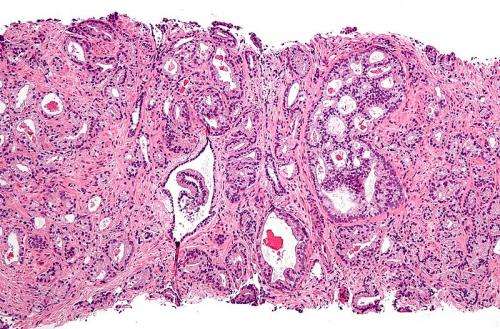Researchers identify possible drug target for prostate cancer

Researchers from Boston University School of Medicine (BUSM) have discovered that the protein BRD4 could be an important new target to prevent castration-resistant prostate cancer metastases.
Castration-resistant prostate cancer is a highly aggressive form of prostate cancer that often leads to the development of lethal metastases that kills more than 31,000 American men every year. The standard of care treatment for these patients typically includes disruption of androgen receptor signaling with drugs called 'androgen deprivation therapy.' While effective for an average of two-three years, this therapy eventually fails to impede cancer progression, due to acquired resistance to the drugs. Patients then develop metastases and curing the cancer is no longer possible.
Under the direction of BUSM's Gerald V. Denis Ph.D., associate professor of medicine and pharmacology, researchers have long studied a family of three closely related proteins, called BET bromodomain proteins, composed of BRD2, BRD3 and BRD4, which regulate gene expression. BUSM researchers were the first (in the 1990s) to show how these proteins function in human cancer.
The researchers examined prostate cancer cell lines that model common forms of prostate cancer that are resistant to androgen deprivation therapy and found that BRD4, but not similar family members BRD2 or BRD3, regulates the expression of key proteins that directly contribute to prostate cancer disease progression. "These findings are novel because, until now, it was not clear which of the BET family of proteins regulate transcriptional programs, or how they influence prostate cancer cell morphology (shape and polarity), motility (the ability to move independently) and invasiveness, each of which are associated with ability to metastasize," explained first author Jordan Shafran, Ph.D., researcher in the department of molecular and translational medicine at BUSM.
According to the researchers, these findings are significant because current therapeutic options for castration-resistant prostate cancer are limited and focus primarily on suppressing prostate tumor cells that rely on androgen receptor signaling. "As prostate tumor cells become resistant to therapy, their reliance on androgen receptor signaling is reduced and alternative signaling mechanisms are activated. Out of this complex mixture, the metastatic cells arise," added Denis, the corresponding author.
The researchers believe it is imperative to identify new targets that regulate the expression of critical transcription factors across diverse prostate cancer cell types in order to block migration and invasion and eventual metastasis.



















